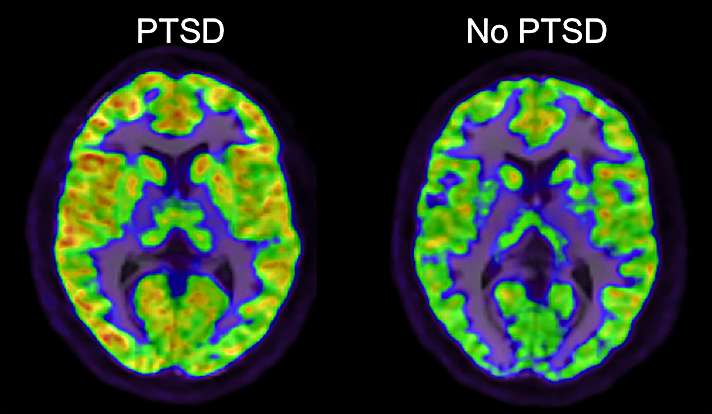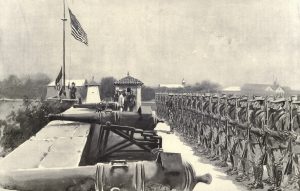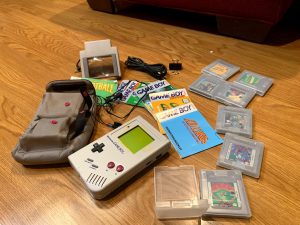Winner of the Fall 2018 StMU History Media Award for
Best Article in the Category of “Military History”
Best Article in the Category of “Science & Technology”
Charles Meyers, a Medical Officer, introduced the term “Shell Shock” to explain symptoms of Post Traumatic Stress Disorder (PTSD) displayed by military after combat in World War I (WWI). Soldiers often experienced symptoms including fatigue, tremor, confusion, nightmares, impaired sight, and impaired hearing. Meyers assumed that these symptoms were caused by the soldiers’ exposure to exploding shells, not necessarily the trauma they were witnessing or going through. In these years, symptoms of widespread PTSD were considered “weak” traits for soldiers by their colleagues and bosses. Even society as a whole started to view these symptoms negatively, which led to the destruction of their relationships after the Shell Shocked soldiers arrived home.1
Military gave Shell Shock victims no sympathy. When soldiers were dismissed from their duties, they were given labels such as “cowardice” or “emotionally weak.” These labels led to soldiers being targeted for abuse from their own side, as well as mock trials in which they were convicted. The pardons they received weren’t honorable, so they were often ashamed of their disorder, which led to more mental issues among the soldiers like depression, anxiety, and even suicide.2

New treatments flipped understandings of how World War I caused drastic changes in the behaviors of these men. Treatment for Shell Shocked victims before Arthur Hurst’s “miracle treatments” were very harsh, as they were often treated with Electroconvulsive Therapy, emotional deprivation, shaming, and solitary confinement. Some of the lesser treatments were hypnosis, massage, rest, and dietary treatments.3
Arthur Hurst primarily used occupational therapy to treat Shell Shocked patients, treating them as humanely and sympathetically as possible. This dignified care allowed for the increased numbers of “saved” soldiers, as they found ways to overcome the abuse and the labels given to them after their dishonorable discharges. Hurst’s treatments became iconic after the Newton Abbott’s Seale Hayne in Devon. Hurst’s approach allowed for 90% of Shell Shocked soldiers to be cured after only a single session.4

Modern day treatments, consist of therapy, as well as new medicines that aid in the control of the symptoms. According to Michael James, a pharmacist, there are Selective Serotonin Reuptake Inhibitors (SSRIs) that block the re-uptake of serotonin in the brain and help with sleep disorders, nightmares, and decreases intrusive thoughts. James also informed me that Serotonin Norepinephrine Reuptake Inhibitors (SNRIs) block the re-uptake of serotonin and norepinephrine in the brain which also decrease intrusive thoughts and provide aid for sleep disorders and nightmares.5
Hurst’s approach led to a change of heart and a consensus to the overall approach by society as a whole. Now, Veterans Affairs, also known as the VA, has a large program that provides aid to veterans with PTSD. However, this evolution of PTSD has not only been beneficial to veterans, but it has also allowed for a more diverse diagnosis of PTSD, in which it is more understood that other people, in addition to veterans, can also experience PTSD. PTSD can be caused from any sort of trauma including car accidents, violent crimes, and domestic violence. Individuals can even develop PTSD from having someone important abandon them as well. The DSM-5 has set a variety of symptoms for PTSD because just like any other disorder, it affects every individual differently. This document allows all individuals to gain access to the tools and help they need to recover from or live with PTSD.6

- Caroline Alexander, “The Shock of War,” Smithsonian Magazine, September 2010, https://www.smithsonianmag.com/history/the-shock-of-war-55376701/. ↵
- “Shell Shock,” BBC Inside Out, March 3, 2004, http://www.bbc.co.uk/insideout/extra/series-1/shell_shocked.shtml. ↵
- “Electroconvulsive Therapy: A History of Controversy, but Also of Help,” The Science Explorer, January 13, 2017, http://thescienceexplorer.com/brain-and-body/electroconvulsive-therapy-history-controversy-also-help; “Arthur Hurst: The Man Who Filmed Shell Shock,” BBC Radio 4, http://www.bbc.co.uk/programmes/articles/4VqPtrjsgcPKtgmYc2M5vXz/arthur-hurst-the-man-who-filmed-shell-shock. ↵
- “Arthur Hurst: The Man Who Filmed Shell Shock,” BBC Radio 4, http://www.bbc.co.uk/programmes/articles/4VqPtrjsgcPKtgmYc2M5vXz/arthur-hurst-the-man-who-filmed-shell-shock. ↵
- Email with Michael James, September 11, 2018. ↵
- Pete Walker, From Surviving to Thriving (Scotts Valley, CA: CreateSpace Independent Publishing Platform, 2013), 13-14. ↵



160 comments
Gabriela Murillo Diaz
I admire your choice of topic. This is something that is constantly ignored. Soldiers undergo trauma and sacrifice their well being to be on the front lines. PTSD should not be ignored and should be address, especially, when it comes to these soldiers. I am glad a man like Hurst stepped up to make a difference in the stigma that surrounds PTSD. I hope we continue to head in this direction and assist those who have suffered trauma.
Daniela Martinez
I think that this is a topic of great concern. by reading the article i was able to learn more about the topic as it was easy to read and understand. I enjoyed reading this article because it provided a problem and its solution more or less. This article brings light to the fact that ptsd is a condition that should be taken seriously. Additionally it is something that should not be a form of discrimination to anyone.
Montserrat Moreno Ramirez
As I said before, I think that the ignorance of the people in the past drove a lot of war hero to end up dead. I just can’t imagine what this heroes have been through and the pain and loss they feel, it is completely normal to have a trauma after what they lived, all those cruel and sad memories must be a torment. It is great that now there is a treat meant and people and experts can actually help them
Rebecca Campos
This article is informative and very useful for a number of reasons. I believe it probably educates people on the truth about PTSD and what soldiers really go through both on and off the battlefield. The article is very easy to understand and therefore make misunderstanding more clear and help readers be able to make more sense out of all of this. Soldiers are brave individuals who sacrifice everything for the good and safety of others. They give up everything for their country and I believe it is only right that the receive the honor and respect they deserve for doing so and not be looked down upon simply because of an illness they have.
William Ward
Based on an incredibly interesting topic, this article was very descriptive and saddening at the same time. It is not hard to see why it was nominated for an award. It is terrible that in our society, injured vets hold their head high and never let you see them bleed because it is a sign of weakness. Very well written article on a great topic.
Emily Jensen
It is hard for me to read about the history of the treatment to the victims of PTSD due to the barbaric views that society held of them. While we are still not living in a society that respects veterans without negative PTSD social stigmas, we are on the right track to hopefully become one. Congratulations on your nomination for an award!
Tyler Boyd
Congratulations on the nomination! This is a great article about a very tough subject. This was a very interesting look at the evolution of PTSD and the impact that it has on people. This article was clearly very well researched and it shows.
Noah Bolhuis
People that suffer from PTSD after serving our country deserve as much respect and treatment as we as
a country. That starts with society and how we treat them as individuals, and the fact that science has come out and shown that these soldiers are actually mentally affected by war gives us a better understanding of why it happens, and that is absolutely not a sign of weakness.
Bruno Montes de Oca
As time goes on, we as a people keep finding more about PTSD. PTSD is a very serious condition that affects not just war veterans. There have been victims or crimes, police officers, and many other kinds of people that are found with symptoms of PTSD. Scientists also find a link between PTSD and many new things as time goes on. PTSD is serious and there needs to be more care for PTSD patients. I did not know about the military treating their veterans like this, but I have to say I am shocked. I am glad that has changed.
Nathalie Herrera
Great article! It is so sad that even today there is a negative stigma associated with people who have shell shock. It is completely valid that soldiers suffer from mental illness after coming back from war because they were put in such intense situations. Nonetheless, this article was very informative and interesting. This topic should be greatly recognized and not pushed away. Overall, great read!